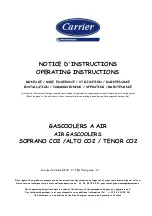
SAFETY
Reminder
Carbon dioxide is a colorless and odorless gas, whose presence in excess in the atmosphere can lead to discomfort, such as headaches,
difficulty concentrating, even with low levels of concentration and nausea in the case of greater than 1000 ppm.
Carbon dioxide gas is heavier than air and is located at lowest point of spaces when they aren’t ventilated.
Machinery room must be equipped with a carbon dioxide detector as required by EN 378.
In case of carbon dioxide evacuation (vacuum draw, etc …), it is important to have a connection through safety valves discharge pipes as
required by EN 378.
As professional, the installer must:
Define the operating conditions of the refrigeration equipment under his own responsibility regarding the design. This device needs to
be incorporated in machines conforming to the Machines Directive. Its commissioning is only authorized if it has been incorporated in
machines which fully satisfy the legal regulations.
Complete and adapt these recommendations, if necessary, by adding other safeties and /or controls according to the refrigeration
equipment’s operating conditions.
Have performed all the installing, commissioning and maintenance operations by qualified professionals and conforming with standards
EN 378, EN 14276, EN 13136, EN 13313, EN 60204 and EN 60335, the EU directives, the safety rules generally recognized, sound
engineering practice, the local regulations; as well as those which may be set up, taking into account the evolution of the technology and
the regulations.
If the installation, the commissioning, the operating, the maintenance are not realized according to this operating instructions, the
responsibility of Profroid cannot be involved.
Completely inform the customer on the control, maintenance and follow-up of the refrigeration equipment.
The devices are delivered under pressurized nitrogen or dry air (make sure at reception that material is under pressure by using a
pressure gauge); except dry cooler, brine air cooler.
Respect the standard for transport and handling of pressure devices.
Install device in a space with sufficient ventilation regarding standards and regulations because device is under pressure of nitrogen
; except dry cooler, brine air cooler.
Very important: before performing any servicing operation on refrigeration equipment, the electric power supply must be turned off.
The contractor or the company in charge of the installation shall be responsible for carrying out the required instructions.
Profroid disclaims any responsibility for change(s) or repair(s) on its devices made without its prior agreement.
The devices are exclusively intended for professionals, for refrigeration purposes and for their limits of use.
The identification of device and his range of use are written on the name plate. The name plate is stuck on device. Name plates are located :
on the coil for heat exchangers, on the frame for racks, on the housing for condensing units, on the receiver for liquid receiver sets and for
liquid sub-assembly. The name plate is joined to this operating instructions (.pdf). The complete installation must be designed and used not to
exceed the range of use. Device is designed for a maximum ambient temperature of 38°C (as standard configuration).
The user or operator
shall ensure the control and maintenance of the equipment with qualified professional complying with the instructions
below, possibly completed by the installer. For these operations, the standards and directives mentioned above remain usefull.
This is also available during the stop of the refrigeration installation.
The average life cycle for the design of our devices is of a minimum of 10 years, provided if you follow our operating instructions.
Profroid cannot be held responsible in case of violation to the recommendations of them.
Piping of Profroid equipment are made with different types:
-
in copper, standard NF EN 12735
-
in steel, standard NF EN 10216-2 (type P265GH; n° 1.0425)
-
in stainless steel, standard NF EN 10217-7 (type 304L – X2CrNi18-9 ; n° 1.4307)
These piping must be inspected regularly following standards, sound engineering practice and local regulations in the country of use.
Some heat transfer fluids can be harmful or corrosive, and their uses must be realized in relation with their risks, if there is a leak on
piping.






































